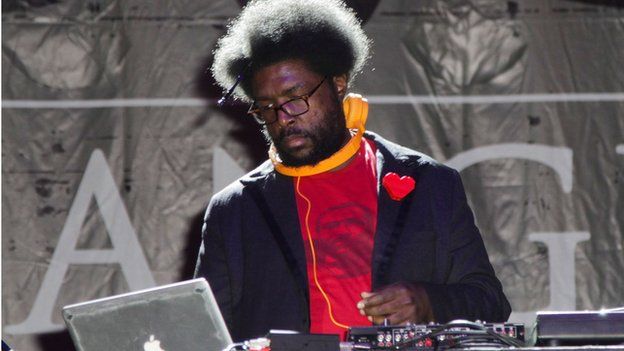Hip-hop is drifting toward 'oblivion'
- Published

A review of the best commentary on and around the world...
Today's must-read
"Hip-hop has taken over black music," writes Ahmir "Questlove" Thompson, drummer for The Roots and band leader for The Tonight Show Starring Jimmy Fallon.
The music's success, Thompson argues, isn't necessarily a good thing.
"Maybe domination isn't quite a victory," he writes for Vulture. "Maybe everpresence isn't quite a virtue."
He says the reason for his concern is simple:
Once hip-hop culture is ubiquitous, it is also invisible. Once it's everywhere, it is nowhere. What once offered resistance to mainstream culture (it was part of the larger tapestry, spooky-action style, but it pulled at the fabric) is now an integral part of the sullen dominant.
The pervasive presences of hip-hop music has led the music to become synonymous with black culture, he continues.
"These days, nearly anything fashioned or put forth by black people gets referred to as 'hip-hop,' even when the description is a poor or pointless fit," he writes.
He concludes that this may be a reflection of hip-hop's success, but the more the label is mindlessly applied, the more it loses its "pertinent sting".
"The danger is that it has drifted into oblivion," he writes.
There are foundational truths that are stitched into the human DNA. But the art forms used to express those truths change without recurring. They go away and don't come back. When hip-hop doesn't occupy an interesting place on the pop-culture terrain, when it is much of the terrain and loses interest even in itself, then what?
Russia
Can World War Two save Russia? - Tikhon Dzyadko, deputy editor for Russian independent television channel DozhadTV, writes for the New Republic that Russian citizens have few points of unification.
To counter this, he says, President Vladimir Putin is using the victory in World War Two as a rallying cry to justify actions in Crimea and to bring the country together in support of the Kremlin.
"The victory in the war is now a weapon in fighting the opposition," he writes.
Nepal
Sherpas risk everything for privileged adventurers - Mount Everest has become a playground for wealthy adventure-seekers, writes Chris Feliciano Arnold in the Los Angeles Times. They are led on their expedition by Nepalese sherpas, who risk their lives with little insurance should something happen to them.
"Though most climbers are good people who show due respect to the mountain and its people, at the end of the day, they are contributing to an industry that puts sherpas at enormous risk of death, potentially tearing entire families apart for the sake of a personal journey," he says.
He argues that the climbing industry needs to figure out how to "encourage sustainable mountaineering in the Himalayas and elsewhere that feeds the human need for adventure while also valuing the lives of the people who consider these beautiful parts of the world their ancestral homes".
Zimbabwe
Witness: Robert Mugabe and me
From hero to "thug" - Journalist Wilf Mbanga used to be close friends with Robert Mugabe when he became the prime minister of Rhodesia, now Zimbabwe, in 1980. Mr Mugabe's election marked the end of white rule in Zimbabwe, but Mbanga says the leader's democratic ideals were lost over time.
"I'm glad we had the relationship, I'm glad I got to know him well, at a time when he really cared about the country, when he really cared about the people," Mbanga tells the BBC.
Mr Mugabe "is still regarded as the father figure, as the revolutionary who brought about the end to the Rhodesian oppressive system", he says.
Germany
Too much time to live - A study released by the Max Planck Institute for Demographic Research states that half of Germans will live to be 100. This has Nataly Bleuel of Suddeutsche Zeitung panicking.
Bleuel worries that many young adults rush through their studies and careers - and later will have an overabundance of time.
"I wish my kids long, healthy lives," she writes (translated by WorldCrunch), "but I do wonder what they are going to do with all that time."
Facing a 100-year lifespan, she concludes, Germans need to overhaul their approach to life.
BBC Monitoring's quotes of the day
US President Barack Obama began his Asian tour on Wednesday with a visit to Japan. Although China is not among the four nations Mr Obama will visit, the trip is being closely watched by the Chinese press.
"The very nature of the US-Japanese alliance is to protect US interests and is not designed for Japan's benefits. Japan is indeed only a 'political mistress' of the US, in that the US may charm it occasionally but will never become its genuine ally." - Editorial in Beijing's Huanqiu Shibao (Global Times).
"The Obama administration is trying to turn Tokyo into the most important guardian of maritime safety in Asia… Against the backdrop of tense Tokyo-Beijing and Tokyo-Seoul relations, the US is urging Japan to play a greater security role in the Asia-Pacific region and may further deepen the security dilemmas in north-east Asia." - Zhao Minghao of Peking University in Beijing's Global Times.
"During the period of one week, Obama will visit Japan, South Korea, Malaysia and the Philippines. Although China is not on the itinerary of this Asia trip, the China issue will be an important topic that Obama cannot avoid. This is a manifestation of the increasing influence of China over the region, and is also a target of the strategy of Asia rebalancing as pushed forward by the US." - Ding Jianting in Guangzhou's Nanfang Daily.
Have you found an interesting opinion piece about global issues that we missed? Share it with us via email at echochambers (at) bbc.co.uk.